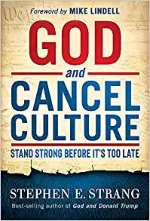This Sickening Stain on American Culture Could Soon Become Indelible
The current push for state-sanctioned racism in public education is passed off under the idealistic and unrealistic name of Critical Race Theory. This shouldn’t come as too much of a surprise for the simple reason that secularism was inaugurated as America’s official religion by eight U.S. Supreme Court Justices in the mid-20th century. And with that, they tore down the American Founding Fathers’ Christian bulwark of liberty and autonomy that had been responsible for 350 remarkable years of American history.
For now, America’s meteoric rise is a thing of the past. In Matthew 11:19c, Jesus observed that “wisdom is justified by her children,” just as a tree is justified by its fruits. Whereas true wisdom shows itself in its providential and favorable effects, secularism is recognized by the dark stain it leaves behind in the culture and daily life.
This stain becomes darker and darker with the sexualization of America’s youth, the mindless vacuity of public schooling and the immoral grooming of junior high 13- and 14-year-old girls being taught the many actions of physical sex.
If we won’t put a stop to this, the stain will soon become indelible.
Conservative author and media critic Mark Steyn (born in 1959) recently made this observation during a Hillsdale College National Leadership Seminar: “America and the West in general have become almost unrecognizable from what they were not that long ago.”
And who would still recognize America while noticing the following:— State-mandated racism in public education.— State-sanctioned induction of pagan secularism in Engel v. Vitale [1962], Abington School District v. Schempp [1963], and Stone v. Graham [1980].—State-warranted right to kill unborn babies – Roe v. Wade [1973].— State-approved exaltation and normalization of sin – Obergefell v. Hodges [2015].— State-appointed “special rights” for homosexual sin – Bostock v. Clayton [2020].
There is no such thing as “neutrality” in religion and public education. To believe in God is every bit of a religious choice as to not believe in God. To include the Bible in public education—as America’s founders instituted—was a religious decision. The 20th century Supreme Court ruling of prohibiting the Bible and prayer in public schools likewise constituted a secular religious decision. It has been asked that if America’s founders wanted to establish Christianity as the official religion of America, why didn’t they just say so? Well, they did. A straight answer to that question can be found in the 13 original states’ charters and constitutions of Massachusetts, Rhode Island, New Hampshire, Connecticut, New York, South Carolina, Georgia, North Carolina, Virginia, Pennsylvania, Delaware, New Jersey and Maryland. goo.gl/cBw4Xh
Thirty-seven years ago, then three-term Georgia Congressman Newt Gingrich said, “I favor public learning, [but] I’m not sure I favor public education anymore.” He then made the case for school voucher programs as the way to empower parents to take control of their children’s education and eliminate the perversion of youth and culture by secularism’s high priests and priestesses in public schools.
The promotion of good character was at the heart of 17th- and 18th-century American education. Its first principle entailed the understanding that “Righteousness makes a nation great, but sin diminishes any people” (Prov. 14:34, ISV). If righteousness indeed exalts a nation, the curriculum therefore should impart loving righteousness, working righteousness, promoting righteousness, procuring righteousness and imparting righteousness to America’s youth.
A school voucher program would be a great idea. K-12 education is, after all, partly or wholly financed by parents, so why not also let them decide what is done with that money? One hundred percent of federal “grants” come from the government putting its hand in the pocket of hardworking, tax-paying citizens. As early as 1984, Gingrich spoke at length about the problem:
All federal aid to help poor families with children’s education would be far more powerful as a motivator if it went not to local bureaucracy, i.e., the public school system, but to the local child or local parent. ‘Here’s a check that can only be spent on learning, but which is your share we in Washington [spend] on helping poor children learn how to read.” You’re going to get a lot further down the road if a parent walks in to talk to the school board and the principal [with their money, because no one is more equipped to make the best decisions for their kids’ education than their parents.] People ask, “Why don’t parents care about their children’s learning?”
I would suggest if we re-empower parents [by having control of the money that can only be spent on their child’s learning], not a check from the federal government to the city to the local school board—but the parent has the check and walks in and says, “What are you going to do for my child?” You’ve got to move away from focusing on teachers and towards focusing on learners. I don’t care how good your teachers are, I care how good your learners are. … we all talk about reading, reading is the most important part of learning, it’s the key to everything. I would rather have kids who can read than any other single quality because that’s the basis for all other qualities. If they can read they will be able to start arguing, they’ll be able to start learning math and so forth.
So I’ve been saying to the kids in my district—because I believe in incentives so deeply—what if we said to you, ‘If you read one book a week and come in and the teacher tests you orally on it [and you pass], you get one day off extra for Thanksgiving—as a reward—one day off extra at Christmas, and one day off extra at Easter. And everybody who hasn’t done that is required to take a test those days you’re off …
Two-thirds of the kids said [I’m in!]—now this is 40 books a year! ABC News reported last year that only 63% of our high school graduates had read all or part of any book by the time they got out of high school. Thirty-seven percent graduated having never read part of a book.
Now here’s a program at no cost to the taxpayer, by changing the management of the internal reward system, would get a kid reading 40 books a year. That means from the time they went from K-12 they’ve read almost 500 books in order to get out one day early, and they felt like an elite.
We are encouraged by the Gideons and Rahabs rising up to stand.
David Lane is the founder of the American Renewal Project.
Read articles like this one and other Spirit-led content in our new platform, CHARISMA PLUS.
 For more information on how you can fight back against cancel culture, make sure to get a copy of what Charisma founder and CEO Stephen Strang says is his most important book yet. God and Cancel Culture releases Sept. 7, the day after Labor Day, wherever fine books are sold. Pre-order it at stevestrangbooks.com or on Amazon.
For more information on how you can fight back against cancel culture, make sure to get a copy of what Charisma founder and CEO Stephen Strang says is his most important book yet. God and Cancel Culture releases Sept. 7, the day after Labor Day, wherever fine books are sold. Pre-order it at stevestrangbooks.com or on Amazon.














































